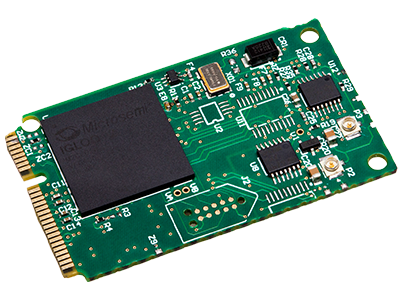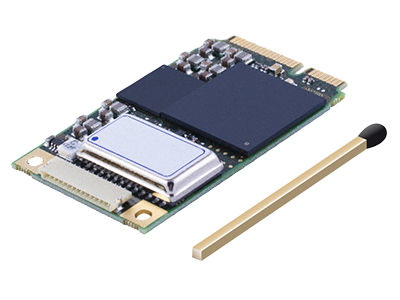miniPCIe
A great new standard for ultra small systems.
We supply Versalogic’s range of miniPCIe industry standard format IO expansion, Brandywine’s miniPCIe timing card and Avionic databus test and simulation from Aim GmbH.
These are versatile cards with lots of IO options, rugged and reliable. Operating in 20G shock and extended temperature environments.
VersaLogic products are designed for use by OEMs working in a variety of market applications: Aerospace, Defence, Energy, Industrial, Security, Medical, Military, Robotics and Transportation. They deliver extremely reliable standard and customised embedded computers backed with unsurpassed service and the highest availability in the market.
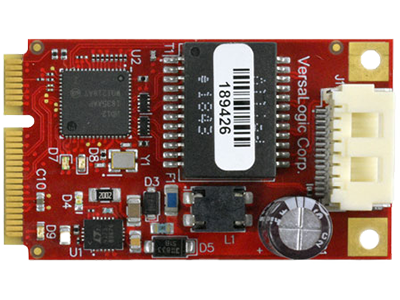
GIGABIT ETHERNET WITH POE+
The ‘E6’ module is an extremely small and rugged Gigabit Ethernet add-on interface that is available with or without support for Power-Over-Ethernet (POE+). Fully contained on a single Mini PCIe module, it does not require an additional daughter cards for magnetic isolation or POE injection circuitry. It provides a simple, clean, rugged way to add an Ethernet interface to most embedded computer systems.
The E6 optionally includes Power Over Ethernet Support (POE+). This ensures that a wide variety of devices, including cameras and wireless access points, can be powered over the Ethernet connection.
The E6 includes IEEE 1588/802.1AS Precision Time Protocol support. This enables precision time-synchronisation between network nodes
The VL-MPEe-E6E and VL-MPEe-E6E-P are designed and tested for full industrial temperature (-40° to +85°C) operation and meets MIL-STD-202H specifications for shock and vibration. It uses a latching connector to address cable detachment issues in hostile environments.
VersaLogic’s 10+ year product life support programmes ensure long-term availability. This avoids expensive upgrades and migrations that come from short, disposable lifecycle products.
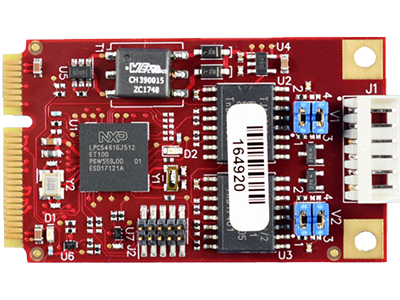
DUAL CAN BUS INTERFACE
The ‘C1’ module is an extremely small and rugged CAN Bus add-on interface. This standard sized Mini PCIe module provides a simple way to add dual isolated CAN Bus interfaces to most embedded computer systems.
The C1 features operation over the full industrial temperature range (-40° to +85°C) and is shock and vibe tested for worry-free use in industrial and military applications. It uses a latching connector to address cable detachment failures. It provides 2.5 kV of signal isolation to protect the host computer.
The C1 module supports the CAN-FD protocol and a wide range of signaling speeds. CAN-FD is fully compatible with CAN 2.0 A and CAN 2.0 B. It supports numerous CAN functions including message acceptance filter, listen-only mode, and wake up over CAN. All configuration parameters are retained after hardware reset or power cycling.
In addition, the module supports the high level CANopen protocol and is compatible with popular operating systems including Windows and Linux.
Like other VersaLogic products, the C1 is designed and validated for operation in unforgiving environments and features 10+ year availability.
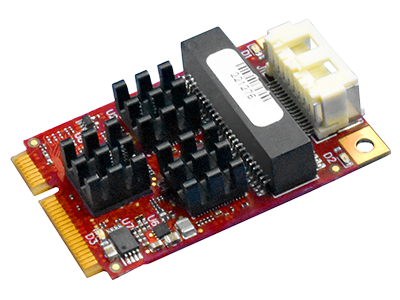
DUAL ETHERNET
The ‘E5’ expansion module is extremely small and rugged. It provides an easy way to add Dual Gigabit Ethernet ports to most embedded computer systems.
The E5 module is completely self-contained with on-board magnetic isolation. There is no need for off-board magnetics or special cabling. The placement of the on-board magnetics isolators has been designed to be compliant with the Intel Ethernet Controller design guidelines to assure proper operation and full data throughput.
For environments with high temperature challenges, the E5 is designed and tested for full speed operation from -40° to +85°C. The miniature on-board heat sinks provide the needed thermal dissipation for uncompromised throughput even at the top of the operating range.
The E5 board uses a 16 pin Clik Mate™ latching connector to provide a mechanically secure connection. The module and cabling is tested for shock and vibration to MIL-STD-202G to ensure performance in demanding environments.
The E5 board is compatible with a variety of popular operating systems including Windows and Linux. Additionally it supports network boot capability.
Like other VersaLogic products, the VL-MPEe-E5E is validated for operation in unforgiving environments. Each component has been carefully sourced to ensure reliable operation in the field.
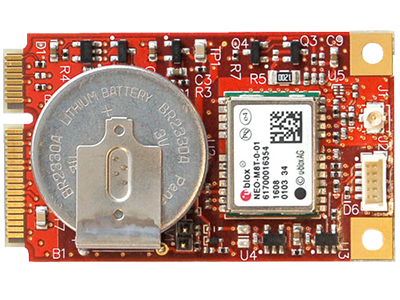
ADVANCED GPS RECEIVER
The VL-MPEu-G3 is an extremely small and rugged GPS module based on the industry-standard Mini PCIe module format. Unlike typical I/O expansion boards, Mini PCIe allows additional I/O functions to be added to a system with almost no increase in overall system / package size. Mini PCIe modules provide a simple, economical and standardised way to add I/O functions to embedded computer products.
The G3 GPS receiver board provides highly accurate global positioning and time-stamp information for embedded systems.
This GPS receiver delivers complete position, velocity, and time (PVT) data for use in host applications. It supports simultaneous 72-channel operation for stable satellite tracking, along with aided GPS startup for fast initial signal acquisition. Support for GPS (United States), GLONASS (Russian), Galileo (European Union) and BeiDou (China), systems provide complementary coverage to enable reliable tracking in difficult environments such as cityscapes and building canyons. Additional internal augmentation systems include Satellite-Based Augmentation System (SBAS), QZSS, IMES and Differential GPS (D-GPS). GPS data is available in NMEA, UBX and RTCM protocols. The GPS data is accessed via USB interface.
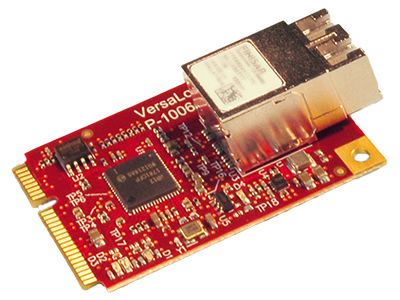
FIBRE-OPTIC ETHERNET I/O
The VL-MPEe-E4 is an extremely small and rugged module for connecting Gigabit Ethernet Over Fibre optic cables. This industry-standard Mini PCIe module provides an easy and economical way to add a fibre-based Ethernet interface to embedded computer systems.
Ethernet over fibre offers an extremely dependable, highly secure Ethernet connection that operates over a much longer distance than copper. Where security matters, a fibre optic connection excels. Fibre optic cables have no electromagnetic signature, making them very difficult to tap compared to wired connections.
This module supports one bi-directional Ethernet channel using industry standard fibre optic cables with LC connectors. It is designed to be rugged and robust for use in industrial and military applications. The module features a wide operating temperature range (-40° to +85°C) and a metal housing around the transceiver to guard against electro-magnetic interference.
The E4 board is compatible with a variety of popular operating systems including Windows, and Linux.
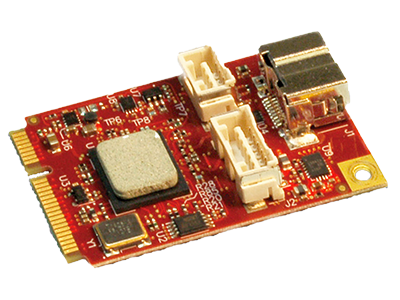
FIREWIRE INTERFACE
The VL-MPEe-FW1 is an extremely small and rugged FireWire module based on the industry-standard Mini PCIe module format. This Mini PCIe module provides an easy and economical way to add FireWire 1394 to an embedded computing solution.
This module supports one FireWire 800 (1394b) and one FireWire 400 (1394a) channel operating at extended temperature. This I/O board is compatible with a variety of popular x86 operating systems including Windows, and Linux.
As with all VersaLogic products, the VL-MPEe-FW1 is designed to support OEM applications where high reliability and long-term availability are required. From application design-in support to 10+ year availability, the VL-MPEe-FW1 provides a durable I/O expansion with an excellent cost of ownership.
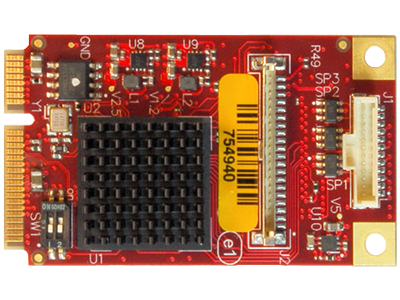
VIDEO EXPANSION MODULE
The VL-MPEe-V5 is an extremely small and rugged video module based on the industry-standard Mini PCIe module format. This Mini PCIe module provides an easy and economical way to add VGA and LVDS display outputs to an embedded computing solution.
This I/O board is compatible with a variety of popular x86 operating systems including Windows, Windows Embedded, and Linux.
As with all VersaLogic products, the VL-MPEe-V5 is designed to support OEM applications where high reliability and long-term availability are required. From application design-in support, to its 10+ year availability, the VL-MPEe-V5 provides a durable video expansion with an excellent cost of ownership.
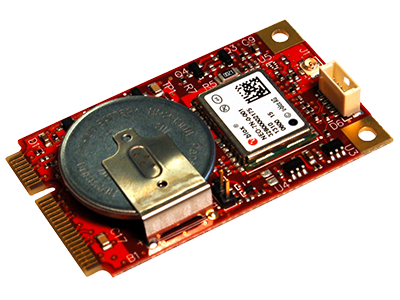
GPS RECEIVER
The VL-MPEu-G2 is an extremely small and rugged GPS module based on the industry-standard Mini PCIe module format. Unlike typical I/O expansion boards, Mini PCIe allows additional I/O functions to be added to a system with almost no increase in overall system/package size. Mini PCIe modules provide a simple, economical and standardised way to add I/O functions to embedded computer products.
Details:
In a very small package, this GPS receiver board provides global positioning and time-stamp information in embedded systems.
This GPS receiver module delivers complete position, velocity, and time (PVT) data for use in host applications. The GPS receiver provides simultaneous 56-channel operation for stable satellite tracking and aided GPS startup for fast initial signal acquisition. Support for GPS (United States), GLONASS (Russian), Galileo and QZSS systems provide complementary coverage to enable reliable tracking in difficult environments such as cityscape/building canyons. GPS data is available in NMEA, UBX and RTCM protocols. The GPS data is accessed via USB.
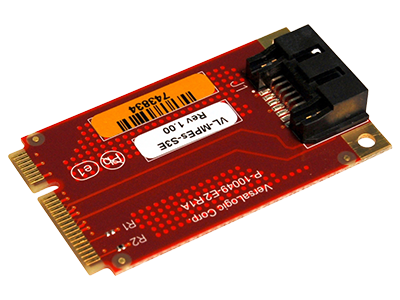
SATA INTERFACE
The VL-MPEs-S3 is an extremely small and rugged SATA adapter module based on the industry-standard Mini PCIe module format. Unlike typical I/O expansion boards, Mini PCIe allows additional I/O functions to be added to a system with almost no increase in overall system/package size. Mini PCIe modules provide a simple, economical and standardised way to add I/O functions to embedded computer products.
Details:
In a very small package, this SATA adapter board provides access to one SATA port from the host system. This SATA adapter supports high-capacity storage (rotating media or solid-state drives) at up to 3 Gbit/s.
This rugged product is designed and tested for full industrial temperature operation (-40º to +85ºC). It also meets MIL-STD-202G specifications for shock and vibration.
This SATA adapter is compatible with a variety of popular x86 operating systems including Windows, Windows Embedded, Linux, VxWorks, and QNX.
The module utilises SATA signaling and can be used in any system that supports SATA signaling at the Mini PCIe socket.
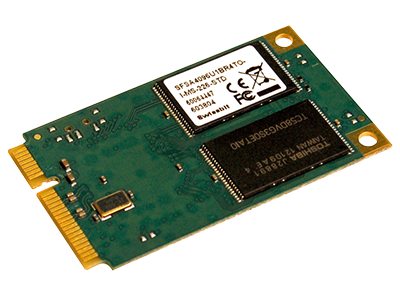
DATA STORAGE
The VL-MPEs-F1 is an extremely small and rugged mSATA module based on the industry-standard Mini PCIe module format. Unlike typical I/O expansion boards, Mini PCIe allows additional I/O functions to be added to a system with almost no increase in overall system/package size. Mini PCIe modules provide a simple, economical, and standardized way to add I/O functions to embedded computer products.
Details
In a very small package, this board provides up to 32 GB of plug-in flash data storage for almost any embedded system.
This non-volatile memory drive provides high-capacity data storage. The drive has an intelligent internal controller which manages interface protocols, data storage and retrieval. The wear leveling mechanism assures an equal usage of the Flash memory cells to maximise the longevity of the device. The hardware BCH-code ECC detects and corrects internal errors. The voltage detector and power-loss management features prevent data corruption after power-down.
This rugged product is designed and tested for full industrial temperature operation (-40º to +85ºC). It also meets MIL-STD-202G specifications for shock and vibration, making it at home in harsh environments.
This mSATA board is compatible with a variety of popular x86 operating systems including Windows, Windows Embedded, and Linux.
The module utilises SATA signaling and can be used in any system that supports SATA signaling at the Mini PCIe socket.
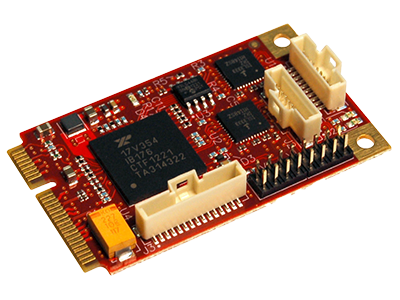
SERIAL I/O
The VL-MPEe-U2 is an extremely small and rugged I/O module based on the industry-standard Mini PCIe module format. Unlike typical I/O expansion boards, Mini PCIe allows additional I/O functions to be added to a system with almost no increase in overall system/package size. Mini PCIe modules provide a simple, economical, and standardised way to add I/O functions to embedded computer products.
Details:
In a very small package, this board provides four serial ports, twelve general purpose I/O lines, and three indicator LEDs.
This serial plus GPIO module provides a traditional serial I/O interface for legacy communication. The serial ports operate in 4-wire mode with auto-direction control and baud rates up to 400 Kbps. Each port can be independently configured (hard jumpered) for RS-232, RS-422, or RS-485 operation.
The twelve GPIO lines are independently configurable as an input or output. GPIO inputs can be set for normal or inverted level, and optionally set to generate an interrupt. GPIO outputs can be set to be normal HIGH or LOW state, or open drain.
The on-board indicator LEDs include one power indicator and two user LEDs that can be jumpered to GPIO pins.
This rugged product is designed and tested for full industrial temperature operation (-40º to +85ºC). It also meets MIL-STD-202G specifications for shock and vibration. Latching connectors provide additional ruggedisation, making it at home in harsh environments.
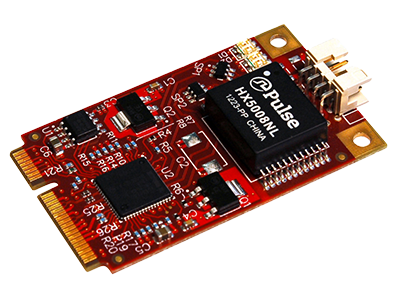
ETHERNET EXPANSION
The VL-MPEe-E3 is an extremely small and rugged Ethernet module based on the industry-standard Mini PCIe module format. Unlike typical I/O expansion boards, Mini PCIe allows additional I/O functions to be added to a system with almost no increase in overall system/package size. Mini PCIe modules provide a simple, economical, and standardised way to add I/O functions to embedded computer products.
Details:
In a very small package, this Ethernet board provides a full speed Gigabit Ethernet port based on the Intel® 82574IT controller.
This rugged product is designed and tested for full industrial temperature operation (-40º to +85ºC). It also meets MIL-STD-202G specifications for shock and vibration. Transient voltage suppression (TVS) devices on the external connections provide enhanced protection from electrostatic discharge (ESD) damage. The latching Ethernet connector provides additional ruggedisation, making it at home in harsh environments.
A PXE boot option ROM is included in the EEPROM of this board to enable network booting. Three LED outputs can be individually configured to select the particular event, state or activity indicated for each output. In addition, each LED can be configured for output polarity and blinking/steady-state indication.
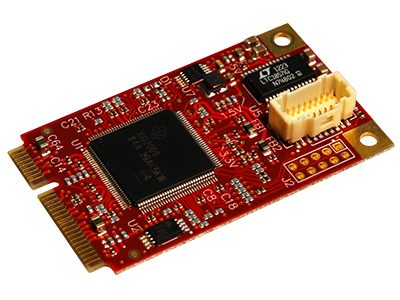
ANALOGUE INPUT
The VL-MPEe-A1 is an extremely small and rugged analogue input module based on the industry-standard Mini PCIe module format. Unlike typical I/O expansion boards, Mini PCIe allows additional I/O functions to be added to a system with almost no increase in overall system/package size. Mini PCIe modules provide a simple, economical and standardised way to add I/O functions to embedded computer products.
In a very small package, this analogue board provides eight single-ended or four differential input channels. The VL-MPEe-A1 model provides 12-bit resolution, while the VL-MPEe-A2 model provides 16-bit resolution.
Operating at 100,000 samples per second, each input channel is individually configurable for an input range of 0 to 5V, -5 to +5V, 0 to +10V and -10 to +10V.
In addition, the board provides three general purpose digital I/O lines which are independently configurable for input, output or interrupts.
This rugged product is designed and tested for full industrial temperature operation (-40º to +85ºC). It also meets MIL-STD-202G specifications for shock and vibration, making it at home in harsh environments.
The VL-MPEe-A1 board is supported by device drivers and the VersaAPI Application Programing Interface. The VersaAPI includes pre-defined calls to send or retrieve data from the on-board I/O ports. These calls greatly simplify development of the user code needed to access these ports. On the VL-MPEe-A1 board, the VersaAPI supports the on-board A/D channels and GPIO lines. The VersaAPI is compatible with Windows, Windows Embedded and Linux operating systems.
This analogue input board is compatible with a variety of popular x86 operating systems including Windows, Windows Embedded and Linux.
The module utilises PCIe signaling and can be used in any system that supports PCIe signaling at the Mini PCIe socket.
The on-board clock accepts an IRIG A, B or NASA 36 input and accepts user input reference input signal delay information. An IRIG B code generator is available.
The advanced microprocessor on the Mini PCIe SyncClock32 module constantly measures the time error between the on-board clock and the reference input code and adjusts the error measurement for propagation delay. In units with a disciplined TCXO or OCXO the residual error is used in an adaptive gain loop to adjust the frequency of the oscillator for minimum error. If the incoming time code is missing, or corrupted by noise, the on-board clock is updated using the disciplined oscillator. When the input code is again useable the correction loop is smoothly closed.
58 bits of BCD time data are available to the host computer using two zero latency time reads. The time message contains units of microseconds through units of years. A status word is available using an additional read.
The exact time-of-occurrence of random external events may be captured by using the Event Time input. When the event input is sensed the current time is saved in a buffer for later interrogation by the host. The resolution of the time tag is 100 nanoseconds.
Internal or external processes may be automatically initiated or terminated by using the Match Time feature. This feature asserts an output when the clock’s time matches that of the user input start time. The output is terminated under user control or when the pre-programmed stop time is encountered. The resolution of the Match Time comparison is one microsecond.
Three user programmable pulse rates are provided. Two pulse rates, Clock Low and Clock High are available on the multi-pin connector. The third rate generator provides heartbeat timing to the host. The divider for each of the three rate generators is programmable by the host over the range 2–65,535. The inputs to the rate generators are 3 MHz or 100 Hz for the heartbeat, 3 MHz for Clock High and 100 Hz for Clock Low.
Software packages for Windows, VxWorks and Linux are available. C language samples are supplied with the Mini PCIe SyncClock32.
AIM is a leading designer and manufacturer of high performance test and simulation modules, embedded interfaces, databus analysers, network analysers and customised systems for MIL-STD-1553A, ARINC429, AFDX/ARINC664P7, ARINC825 (CAN bus) and Fibre Channel.
AIM’s field proven, robust and mature product suite is unsurpassed in the avionics test and simulation market and our pedigree is recognised throughout the world. Our products and services set the standard for the industry.
For more information head over to our designated Avionics page here.
Example: AMEE1553-2 is AIM’s new PCI Express Mini Card module
This small form factor mPCIe card targets embedded applications and hosts up to two dual redundant MIL-STD-1553 channels on a single PCI Express Mini (mPCIe) card format. This provides an easy way to add a rugged and reliable MIL-STD-1553 interface to any system with a Mini-PCIe card slot included but not limited to COM Express and PCIe104 systems.
- Up to two dual redundant MIL-STD-1553/MIL-STD-1760 channels
- Rugged on-board connector for high reliablility
- Low power dissipation
- Dedicated avionics discrete inputs can be used for RT addressing
- Avionic inputs/outputs and triggers
- On-board IRIG-B time decoder

